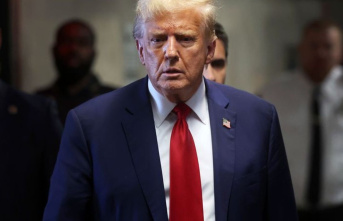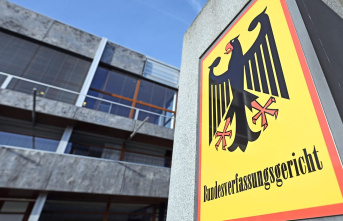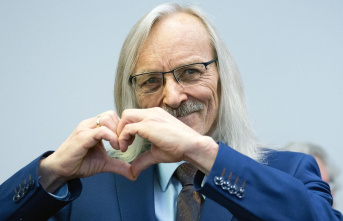Ukraine wants to be a member of the European Union by 2025. Is big disappointment programmed? This Thursday, EU Commission President Ursula von der Leyen traveled to Kyiv for an eagerly awaited visit.
Why is Ukraine stepping on the gas?
The topic of EU accession has been on the agenda in Ukraine since the pro-Western coup of 2014 at the latest. So far, however, the poorest country in Europe has always been put off until later, citing the lack of reforms and the country's economic backwardness. Instead of a tangible perspective, there was always talk of decades of waiting.
With the Russian attack, the leadership in Kyiv now sees a unique opportunity to speed up this accession process. The reason given is the victims and the suffering of the Ukrainians, who, from Kiev's point of view, are defending not only Ukraine but all of Europe against Russia. Domestically, the aspired EU accession is therefore to a certain extent a deserved reward for the suffering that has gone through.
Are the hopes realistic?
Publicly, Commission President Ursula von der Leyen and Council President Charles Michel regularly try to outdo each other in their commitments to Ukraine. The hurdles on the way to the union of states are often only mentioned in passing. Just two weeks ago, during a speech in the Ukrainian parliament, Michel said that the question of EU membership had been answered: "We must spare no effort to implement this promise as quickly as possible."
However, the reality is more complicated. Although the EU officially admitted Ukraine to the list of candidate countries last June, current rules mean that Ukraine is unlikely to become a member until the next decade at the earliest. The reason for this is the numerous requirements that have to be met. So far, there has not even been a green light from the EU states for the start of the accession negotiations. It is also subject to conditions.
What conditions does Ukraine have to meet?
Among other things, it is about the selection process for Ukrainian constitutional judges and a stronger fight against corruption - especially at a high level. The EU Commission is also demanding that standards in the fight against money laundering be observed and that a law against the excessive influence of oligarchs be implemented.
The draft statement for the EU-Ukraine summit this Friday states that "full and consistent implementation of judicial reforms" in line with expert recommendations is crucial to progress in the accession process.
Can Ukraine fulfill this in the foreseeable future?
That is extremely unlikely. The European Court of Auditors gave the country a devastating report in September 2021. "Although Ukraine receives all kinds of support from the EU, oligarchs and interest groups continue to undermine the rule of law in Ukraine and endanger the country's development," it said at the time.
The country's gross domestic product per capita shows how much catching up the Ukraine has to do in economic terms. This was around $4830 (€4391) in 2021, according to World Bank data. For the poorest EU country, Romania, the value was around 14,850 dollars (13,499 euros).
Can the Ukrainians already notice progress in reforms?
Most of the reforms demanded by the EU Commission have little to do with everyday life in Ukraine. Shortly before the EU summit, the anti-corruption authorities showed conspicuous activity. Almost daily, house searches and the discovery of valuables and cash worth tens of thousands of euros are reported by state officials.
However, the greatest reform successes that are tangible for the Ukrainians have been achieved in the digitization of the administration. Digital ID cards, driver's licenses, birth certificates and simplified administrative processes are already part of everyday life for Ukrainians. Ukrainian refugees, especially in Germany, were amazed to see how backward and complicated the work of the authorities in the EU is in some cases.
What role does Russia's war play?
Probably a double-edged sword. On the one hand, without the war, Ukraine would probably never have gained candidate status so quickly. On the other hand, the war is likely to complicate efforts to meet the conditions for starting accession negotiations. In addition, it is considered very unlikely that Ukraine will become a member of the EU before the end of the war. Because then Kyiv could demand military assistance from other EU states under Article 42, paragraph 7 of the EU treaty - the EU would officially be a war party.
Did von der Leyen comment on the EU accession process in Kyiv?
At a press conference, the former German defense minister praised Ukraine's "impressive progress" in meeting the seven prerequisites for the start of accession talks. At the same time, however, she also indicated that further efforts were necessary. "I recommend that you quickly ensure at the political level that the fight against corruption brings tangible results and is further intensified," she said alongside Ukrainian President Volodymyr Zelenskyy.
What's next?
The EU Commission intends to present a detailed report on Ukraine's reform progress after the summer. On this basis, the EU states must decide whether accession negotiations can be started. Ursula von der Leyen made it clear in Kyiv that supporting Ukraine in the fight against Russia is independent of this.
Specifically, she promised, among other things, more than 150 million euros for the purchase of important energy technology and another 2,400 power generators. In addition, the European training mission for Ukrainian armed forces will be significantly expanded. Instead of 15,000, 30,000 Ukrainian soldiers are now to be trained in EU countries.











